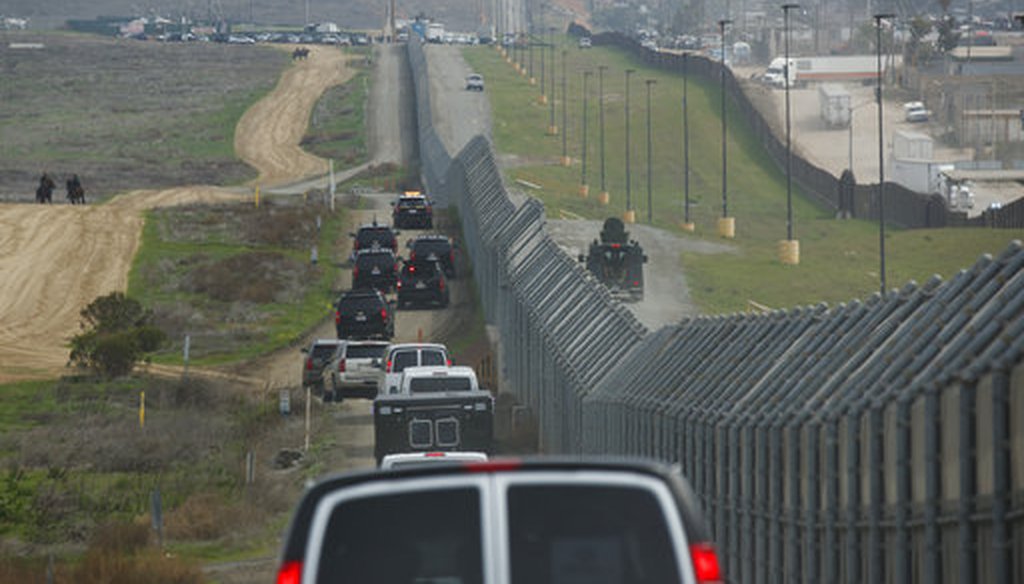Stand up for the facts!
Our only agenda is to publish the truth so you can be an informed participant in democracy.
We need your help.
I would like to contribute

A motorcade carrying President Donald Trump drives along the border before look at border wall prototypes, Tuesday, March 13, 2018, in San Diego. (AP Photo/Evan Vucci)
Lacking money for a full border wall, President Donald Trump said he’s exploring using the military to stop illegal immigration at the U.S.-Mexico border.
"We don't have laws. We have catch and release. You catch and then you immediately release, and people come back years later for a court case, except they virtually never come back," Trump said at an April 3 press conference. "So we are preparing for the military to secure our border between Mexico and the United States."
Trump’s remarks about using the military to secure the border left us wondering if U.S. laws allow it and whether there have been other instances of this happening.
Generally, active-duty military can't be used for domestic law enforcement. However, Trump may be able to deploy the National Guard (which his administration said is the plan).
What we know about Trump’s plan
Trump’s comments at first left people wondering if he meant staffing the border with active-duty service members of the armed forces. Trump’s team has clarified his strategy as mobilizing the National Guard, a reserve military component of the U.S. military.
National Guards members can be deployed by either a state governor or the president, and respond to domestic emergencies, overseas combat missions, counterdrug efforts or reconstruction missions.
Many details remain unknown about Trump’s plan, including how much it would cost or for how long deployment would last.
At a press briefing April 4, Department of Homeland Security Secretary Kirstjen Nielsen said Trump directed her department and the Defense Department to work with governors to deploy the National Guard to the southern border. She said Trump would sign a proclamation to that effect. (It had not been publicly shared as of 5:30 p.m. April 4.) Deployment would happen through a memorandum of agreement with governors, Nielsen said.
Under Title 32 duty status, members are under the command and control of the state governor but paid by the federal government and can undertake "Homeland Defense activities." That means activities that protect territories, domestic U.S. population, infrastructure or other assets from a threat or aggression against the United States.
Deployment could begin immediately, Nielsen said. The National Guard would offer U.S. Customs and Border Protection officers support, such as aerial surveillance, she said.
Has this happened before?
Members of the National Guard have been deployed at least twice in recent years, under both President George W. Bush and President Barack Obama.
Bush announced the deployment of up to 6,000 National Guard troops to the southern border to support the Border Patrol in 2006, in response to requests from governors of Arizona, California, New Mexico, and Texas, according to the Congressional Research Service.
Under Operation Jump Start, troops offered engineering, aviation, and entry identification teams, plus technical, logistical, and administrative support. But they did not participate in direct law enforcement activities, the report said.
In 2010, Obama announced that up to 1,200 National Guard troops would be deployed to the southern border to support Border Patrol with aerial surveillance and detection.
Under the Bush and Obama operations, Border Patrol agents were tasked with conducting arrests and seizures at the border, not troops.
Can active-duty military members be sent to secure the southwest border?
The Posse Comitatus Act of 1878 restricts the military from engaging in civil law enforcement. But troops can be sent to support Border Patrol agents.
"The military does not appear to have a direct legislative mandate to protect or patrol the border or to engage in immigration enforcement," said a 2013 Congressional Research Service report.
The Posse Comitatus Act bars the Army and Air Force from being deployed to execute laws unless otherwise authorized by Congress or the Constitution. A 1992 law subjected the Navy and Marine Corps to the rule.
The Coast Guard, tasked with defending the country’s maritime borders, operates under the Department of Homeland Security. But it’s under the Navy’s control during times of war.
Military personnel acting in a passive capacity may assist law enforcement authorities and not run afoul to the Posse Comitatus Act, said Timothy MacArthur, director and clinical professor at Mason Veterans and Servicemembers Legal Clinic at the Antonin Scalia Law School at George Mason University, and Leigh Winstead, the clinic’s managing attorney.
"Permissible instances of passive activity by military personnel have included surveillance, training, information-sharing, transportation assistance, or any act normally performed in the ordinary course of their duties," they said via email. "Generally, anything short of search, seizure and arrest."
Our Sources
Listed in the story.










































